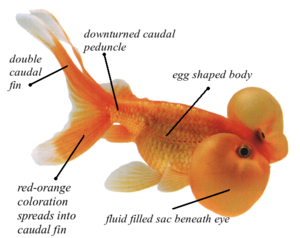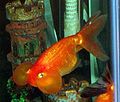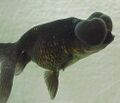Bubble-eye Goldfish
| Bubble-eye Goldfish | |
|---|---|

| |
| Family | Cyprinidae |
| Size | Variable |
| Tank Level | All |
| Temperament | Peaceful |
| Tail Type | Twin-tailed |
| Country of Origin | China |
For an in depth tutorial, see our guide
The Bubble-eye Goldfish, also known as suihogan in Japan, is a breed of "fancy" goldfish with large fluid filled sacs beneath its eyes. Due to its unweildy, unnatural appearance, much controversy surronds the breeding of this fish. Many claim that selective breeding has turned the Bubble-eye strain into a species unable to survive in any environment other than the aquarium, and this selective breeding should be stopped. On the other side of the controversy, advocates for the breeding of Bubble-eyes and other "fancy" goldfish say that in the hands of a responsible owner the fish leads a quiet and fulfilling life, not having to compete for food at all.
Physical description
The enlarged fluid-filled sacs beneath the eyes of this variety of twintail are highly distinctive, and they sway as the fish swims. The rest of the body is roughly egg-shaped with a straight dorsal surface. The coloration varies but is usually metallic red-orange. The dorsal fin is absent and the anal and caudal fins are doubled, the extravagant caudal fin flowing from a down-turned caudal peduncle.
History
The Bubble-eye Goldfish variety was first developed in 1908 in China, although there is evidence to suggest they existed in the eighteenth century.
In the aquarium
The eye sacs are prone to damage, so it is best to keep this strain in its own aquarium, without sharp-edged furnishings. Like all twin-tailed varieties, Bubble-eyes are not suited to pond life, as they will not be able to compete for food with faster fish. Furthermore, the Bubble-eye should not even be kept with other twin-tail varieties, as the eye sacs impede its movement so much that it won't be able to compete with even the slowest of rivals.
Gallery
- BubbleeyeGoldfish.jpg
A Bubble-eye Goldfish
Related Topics
Parent topics
 Fish: Any aquatic vertebrate animal that is typically ectothermic (or cold-blooded), covered with scales, and equipped with two sets of paired fins and several unpaired fins. [e]
Fish: Any aquatic vertebrate animal that is typically ectothermic (or cold-blooded), covered with scales, and equipped with two sets of paired fins and several unpaired fins. [e] Animal: A multicellular organism that feeds on other organisms, and is distinguished from plants, fungi, and unicellular organisms. [e]
Animal: A multicellular organism that feeds on other organisms, and is distinguished from plants, fungi, and unicellular organisms. [e] Organism: An individual living individual: a complex, adaptive physical system that acts a integrated unit that sustains metabolism and reproduces progeny that resemble it. [e]
Organism: An individual living individual: a complex, adaptive physical system that acts a integrated unit that sustains metabolism and reproduces progeny that resemble it. [e]- Chordata: Add brief definition or description
- Osteichthyes: Add brief definition or description
- Actinopterygii: Add brief definition or description
- Neopterygii: Add brief definition or description
- Teleostei: Add brief definition or description
- Ostariophysi: Add brief definition or description
- Cypriniformes: Add brief definition or description
- Cyprinioidea: Add brief definition or description
- Cyprinidae: Add brief definition or description
- Carassius: Add brief definition or description
Subtopics
 Comet (goldfish): A goldfish variety developed in 1880 by Hugo Mulertt, and has become one of the best selling aquarium fish since. [e]
Comet (goldfish): A goldfish variety developed in 1880 by Hugo Mulertt, and has become one of the best selling aquarium fish since. [e] Nymph (goldfish): A breed of goldfish descended from the Veiltail and Fantail. [e]
Nymph (goldfish): A breed of goldfish descended from the Veiltail and Fantail. [e] Shubunkin: Also known as "poor mans Koi", the Shubunkin is a breed of goldfish first developed in Japan in the 1900's. [e]
Shubunkin: Also known as "poor mans Koi", the Shubunkin is a breed of goldfish first developed in Japan in the 1900's. [e] Common Goldfish: Common ancestor for most "fancy goldfish". Color is the only difference between the Common Goldfish and its ancestor, the Prussian Carp. [e]
Common Goldfish: Common ancestor for most "fancy goldfish". Color is the only difference between the Common Goldfish and its ancestor, the Prussian Carp. [e]- Celestial Goldfish: Add brief definition or description
- Fantail Goldfish: Add brief definition or description
- Lionhead (goldfish): Add brief definition or description
- Moor (goldfish): Add brief definition or description
- Red-cap Oranda: Add brief definition or description
- Pearlscale (goldfish): Add brief definition or description
- Pom-pom (goldfish): Add brief definition or description
- Veiltail (goldfish): Add brief definition or description
- Japanese Moor: Add brief definition or description
- Red and White Lionhead: Add brief definition or description
- Comet Shubunkin: Add brief definition or description
- Red Ryukin: Add brief definition or description
- Red and White Ryukin: Add brief definition or description
- Red Ranchu: Add brief definition or description
- Red and White Wakin: Add brief definition or description
Bibliography
- Rogers,Geoff. Freshwater Aquarium Fish. 1 ed. Focus on. Buffalo, New York: Firefly Books
- LTD., 2004.
- Mills,Dick. Aquarium Fish. 1 ed. Eyewitness Handbooks. New York, New York: Dorling
- Kindersley, Inc., 1993.
- Bailey,Mary. Aquarium Fish & Fish Care. paperback ed. The Ultimate Encyclopedia of. New
- York, New York: Hermes House, 1999.



